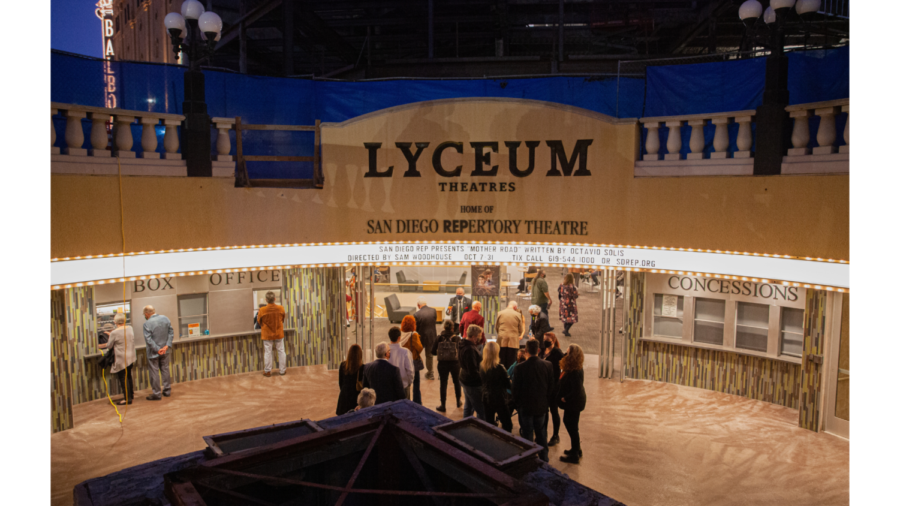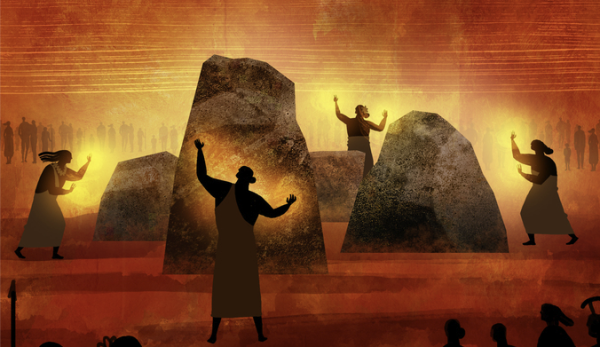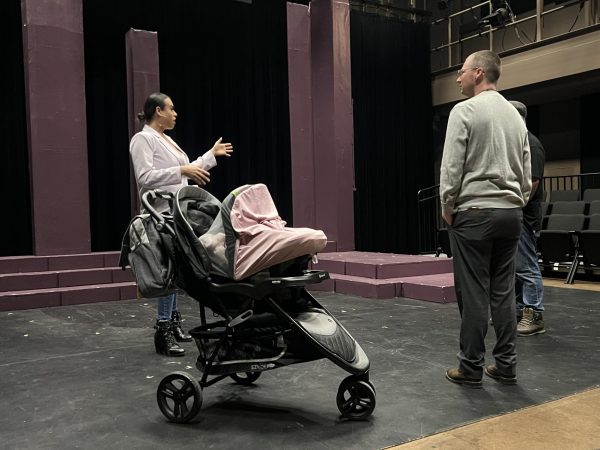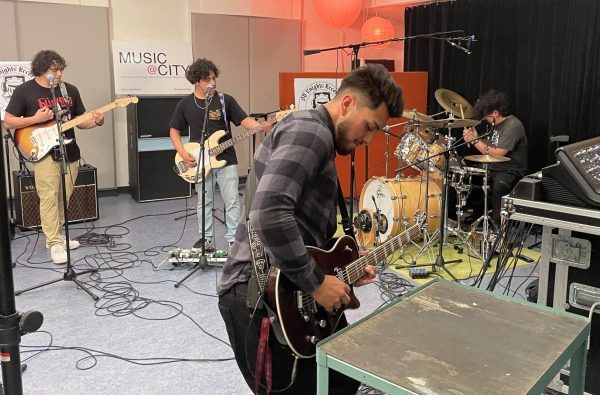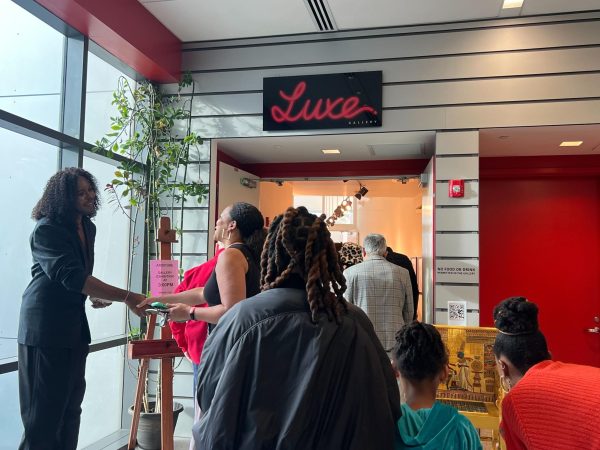REVIEW: SD Rep traces a new story on an old ‘Mother Road’
Octavio Solis’ play stages a myriad of underrepresented voices in a new chapter to John Steinbeck’s “The Grapes of Wrath”
Guests arrive to the debut of Octavio Solis’ “Mother Road” at the Lyceum, home of the San Diego Repertory Theatre, on Oct. 13. In the foreground is the remaining stump upon which once stood Joan Brown’s obelisk, homage to the earth, sea and sky. Photo by Philip Salata/City Times Media
October 26, 2021
Behind blue construction fencing, beneath the rubble of the former Horton Plaza — architect John Jerde’s postmodern public-square-private-mall-turned-ruin — sits the Lyceum, home to the San Diego Repertory Theatre since 1986.
If you peek through the cracks of the fence and down the stairs to its entrance, you can see a fissure — the wiry absence of Joan Brown’s obelisk. It once welcomed theatre goers with a feel-good ode to the earth, sea and sky, but is now hidden away in an undisclosed location.
But on the night of Oct. 13, after 18 months of darkness, the lights came on to debut prominent Latinx playwright Octavio Solis’ “Mother Road,” which imagines a future chapter to John Steinbeck’s “The Grapes of Wrath.”
Steinbeck’s novel follows the trials of migrant laborers forced west to California’s Central Valley from Oklahoma by the Dust Bowl. They came to be known as the “Okies,” a term that today is arguably derogatory.
Solis found inspiration for his play while on a road trip tracing the Okies’ journey back-wards. While visiting a migrant camp, Solis was struck by the storytelling of a young Latinx man who said, “We’re the new Okies, and I’m the new Tom Joad.”
From that moment, Solis said, his project was defined.
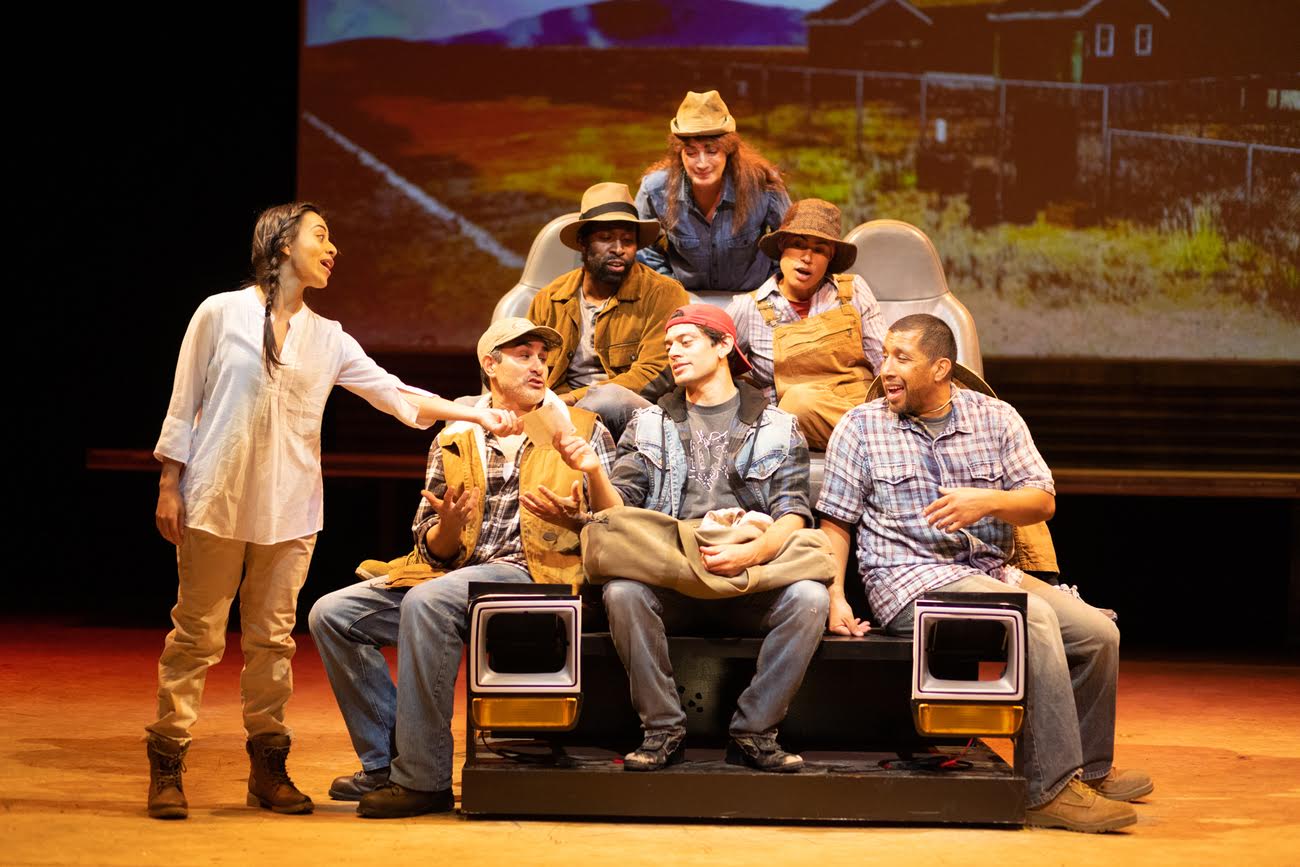
The play begins in present day California at Weedpatch, the migrant labor camp/housing site also featured in Steinbeck’s novel. The site appeared in John Ford’s 1940 film rendition and is now in the National Register of Historic Places while continuing to shelter displaced peoples.
The narrative begins with terminally ill William Joad, first cousin of Steinbeck’s protagonist Tom Joad, who is seeking the last living descendent of the family to pass over the deed to his farm in Oklahoma.
To his surprise, the last Joad turns out to be a young Mexican-American farm worker who lived at Weedpatch seasonally.
The revelation of his name, Martín Jodes, was a punchline in the play.
The audience laughed. William Joad didn’t.
There are a few moments of jarring imagery and language at which the audience palpably recoiled. One instance is when Martín defends his friend from a police officer, choking him until we are left to ask whether or not he is killed.
The chokehold, the hard breathing, seems to reference the murder of George Floyd, but here it is reversed. It is the policeman who is the victim of unchecked rage, though Martín is protecting a friend from an unjust attack.
I would ask if such a reference, the violence of which is still so fresh in our minds, is warranted? Even if it is unintended, this is a sensitive issue worth rethinking.
According to Rebecca Ojeda’s dramaturgical report, in many cases the Dust Bowl migrants overtook jobs from undocumented workers who were under constant threat of deportation, especially if they organized to fight for better labor conditions. This point is raised by Solis, and yet it is resolved all too briefly.
A Latinx motel manager, burdened by the ghost of his father and their troubled family history with the predominantly white migrants, at first denies William Joad a room in the hotel. But it takes no more than a few short retorts to the ghost to overcome this legacy.
William Joad could stay after all.
The tempo and breadth of all these vignettes posed over one road trip across America leave the audience with the sensation of never having really stayed long in any of the towns along the way.
Solis’ writing presents us with complex socio-political themes in a digestible way, and SD Rep artistic director Sam Woodhouse stages them with excellent craft, scoring the drama with energetic candor and at times much-needed humor.
Actor Mark Murphy gives a patient and melodic rendition of William Joad, speaking with a cadence that recalls Hollywood classics. Richard Jessie Johnson depicts Martín with lyricism. His performance brings a contemporary rhythm while reminding us of a troubled young James Dean, who also famously played a Steinbeck character.
Yadi Correa, who plays Martín’s queer friend-in-arms, is a master of timing, often elevating us in somber moments. And Cedric Lamar, in the role of a childhood friend who after years of juvenile detention discovers the blessings of nature, gives an enchanting performance that makes us wish we could feel the same about a tender patch of earth.
Costumes, lighting and stage design all seamlessly aided the story.
Yet after roughly two and half hours, including intermission, we walk out with a feeling of unease.
The plot was complex, but the answers were too simple.
Perhaps this is due to a clash between the tone of the play and the context of the place and time in which it is being presented. A theatre situated in ruins during a time of global ruin.
COVID-19 forced theater makers around the world to translate their art form to the screen. For theater companies such as the San Diego Rep, for whom 50 percent of funding is made up of ticket sales, converting was a creative challenge.
In the meantime, as those of us who could shelter in place watched our screens, the disparities of race and class kept playing out.
A legacy of genocide, slavery, violence, displacement, and structured economic policies made to retain white supremacy shaped the realities that rendered Black, Latinx, Native American, and undocumented peoples disproportionately affected by COVID-19.
In the face of these realities more national discussion around long-established movements for reparations and land acknowledgments has emerged. The formal recognition of this history is past overdue. And yet it has barely begun.
For this reason, as hopeful an image it is of a migrant worker, soon-to-be-land-owner, Martín Jodes crossing the country on Route 66 in his jalopy with his Oklahoma kin, his Latinx lesbian friend whom he appointed farm manager, Black childhood friend from juvie who discovered spirituality in tending the earth, and finally a Choctaw native who attacks William Joad while defending his land from gravediggers and is welcomed jovially in the truck anyway, feels a bit stretched.
I am not saying it couldn’t happen.
In Steinbeck’s novel, the word “Mexican” shows up a handful of times.
He writes, “Once California belonged to Mexico and its land to Mexicans; and a horde of tattered feverish Americans poured in. And such was their hunger for land that they took the land… those frantic hungry men; and they guarded with guns the land they had stolen.”
But before there was Mexico there were Indigenous Peoples. The violence cannot be erased, and the histories, largely written by those for whom the narrative of violence is inconvenient to acknowledge, need the work that Solis undertakes in Mother Road.
The struggles for the most basic resources continue around the globe. Maybe it’s not yet time for forgiveness.
Mother Road
Dates/times: 7 p.m. Wednesdays; 8 p.m. Thursdays and Fridays; 2 and 8 p.m. Saturdays; 2 and 7 p.m. Sundays. Through Oct. 31.
Location: San Diego Repertory Theatre at the Lyceum, 79 Horton Plaza, Downtown.
COVID policy: Full vaccination required or negative COVID-19 PCR test result within 72 hours of curtain. Face masks required.
Tickets: $25-80
Phone: (619) 544-1000
Info: sdrep.org


